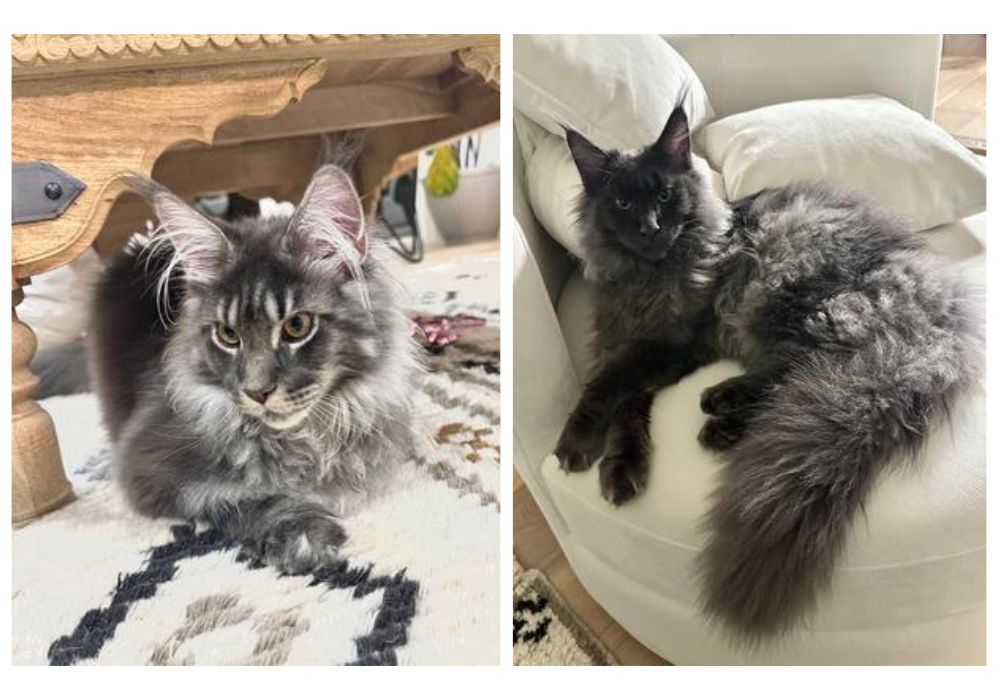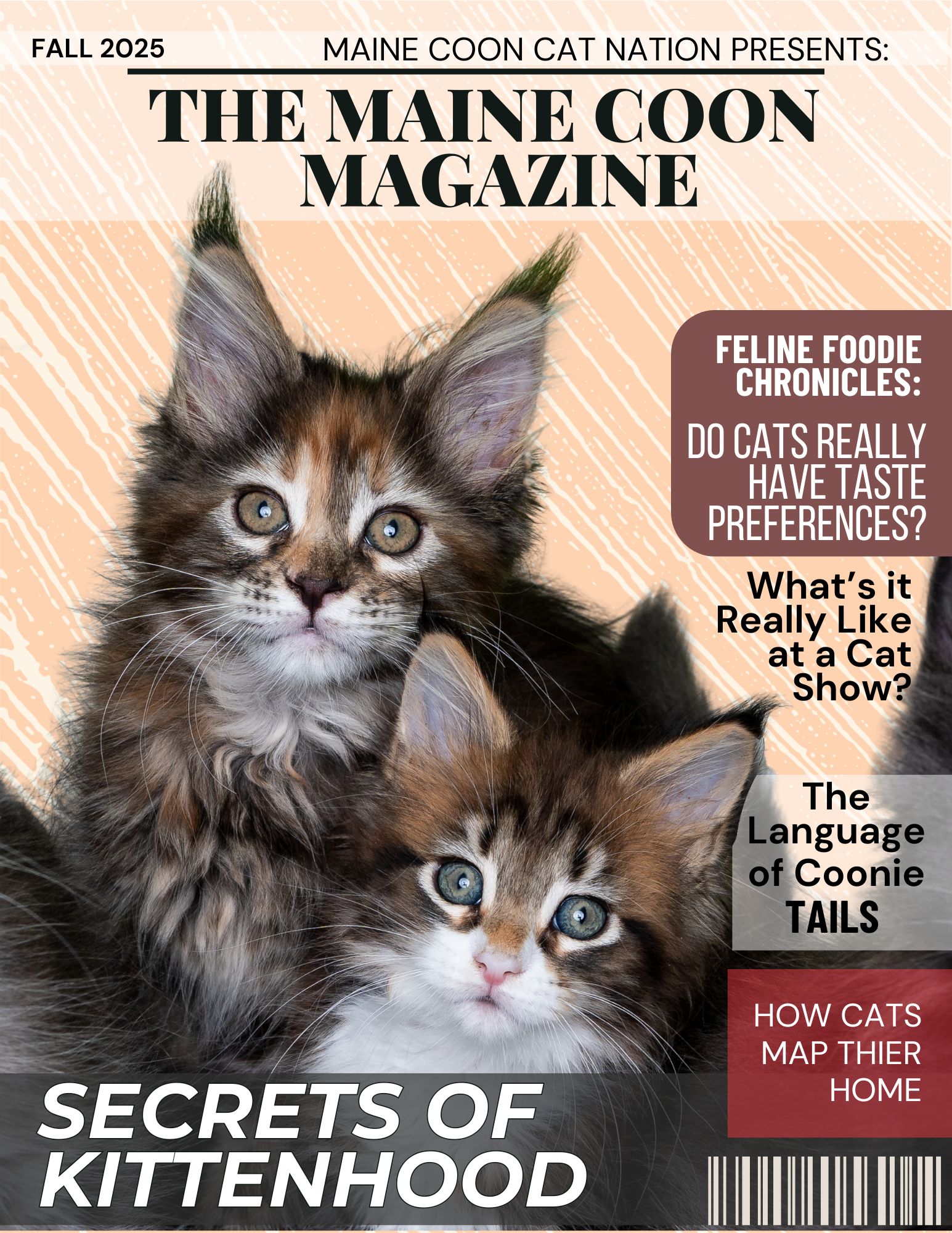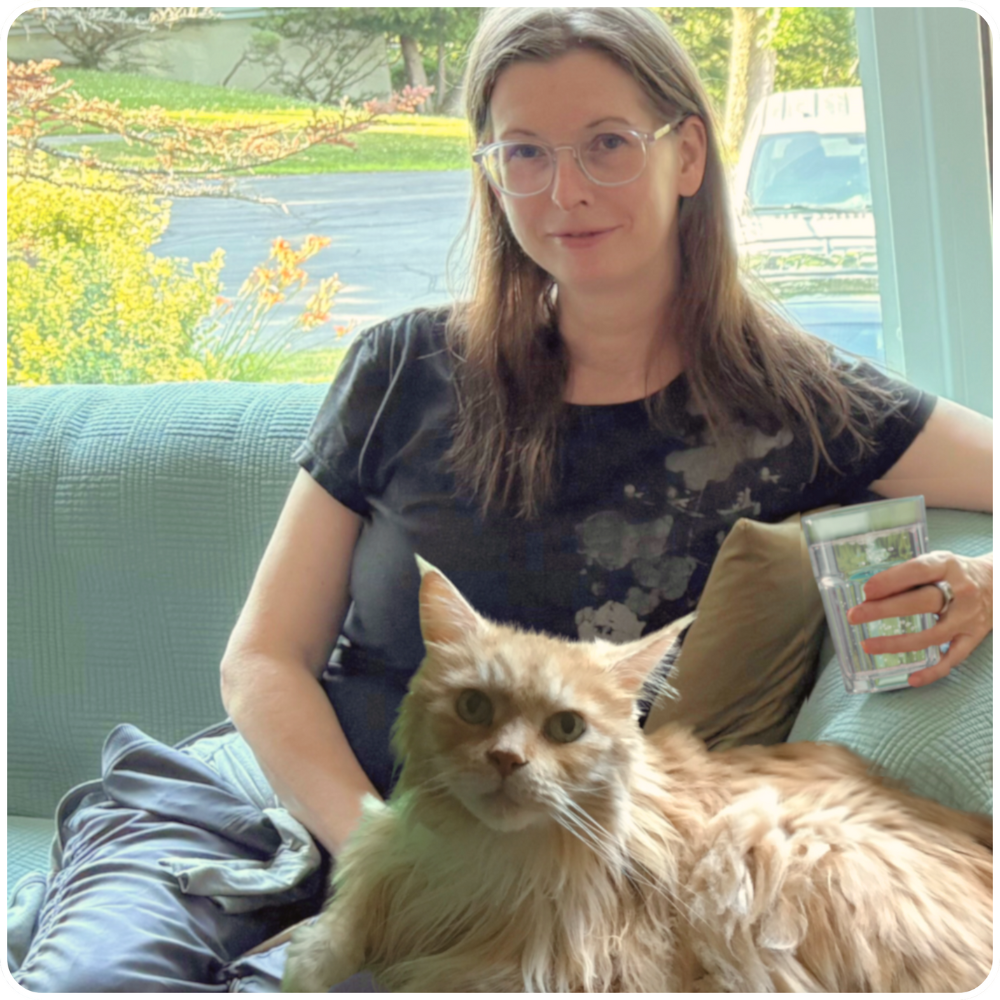- Home
- Maine Coon Food
- Cat Feeding Questions
- Raw Food Diet
Maine Coon Raw Food Diet
Why don’t we have more raw protein options?
by: Steve in Laguna Hills, CA
If you like this, you'll love our fun, free Daily Digest!

If you like this, you'll love our fun, free Daily Digest!

I have two Maine coon kittens, Odin and Loki, they were just under 5 pounds when we got them at 16 weeks old.
They are 14 pounds and 13 pounds respectively at 7 months old.

After talking with our vet, who’s also a close friend, he said there just hasn't been nearly the science on cat food as there has been on dog food, and that cats are a Type A carnivore with different body chemistry and a different digestive system than dogs.
For example they go into insulin over load with even a small amount of carbs in their food. The only carbs a cats is meant to eat is what’s in the stomach of the mouse or bird.
I asked what they are 'made' to eat, and he said in vet school they learned that the best diet profile for a cat's nutritional needs is a mouse, meaning muscle tissue, a bit of bone, and a bit of organ meat.
And after discovering that most cat foods are essentially repackaged and reshaped dog food I started looking into it more deeply.
Dry kibble is a big no-no, it’s meat and carbs that have been oven baked about 5 times before it hits the shelf, nearly all the nutritional content is cooked out, and it bears so little resemblance to meat than they have to add chemical meat flagrant to get cats to eat it, and that includes the 'good stuff.'
Canned food isn’t much better, it's also cooked and processed to the point of very little nutritional content then rehydrated and formed into pâté or chunks, with nearly the same carb and nutrient content as dog foods, that again are not meant for cats.
I feed my cats a 100% raw protein diet, which is ground chicken, beef, organ meat, and a bit of bone. About 5 ounces for each kitten 3 times a day.
They go crazy for it, and no more diarrhea, they go to the bathroom less, and it doesn't smell as bad. They're growing like mad, have great energy levels but not bouncing off the walls from insulin over load due to carbs they can't digest.
We mix in some probiotic and some vitamin supplements a few times a week. Very healthy happy cats and owners. I strongly recommend a raw protein balanced diet for your cats.
I finally found a place that grinds and ships a frozen raw protein diet for these guys, but took forever.
Why don’t we have more suppliers of this clearly healthier option for cats, and why don’t more cat owners feed their cats this way?
Thoughts on a Maine Coon Raw Food Diet:
Hi Steve,
Your kittens are gorgeous! It sounds like you have them on a good raw food diet, and they are really thriving. A Maine Coon's diet is the key to their long and healthy life!
You are right, of course - a raw meat diet is considered the ultimate in top-tier feline nutrition nowadays.
As most of us know, cats are obligate carnivores, meaning they are 'obligated' to eat meat. The essential nutrients found in animal protein and organ meats are exactly what a domestic cat needs to thrive.
To answer your questions about supply and awareness, a few things come to mind:
Limited awareness:
The biggest issue when it comes to raw food diets for Maine Coon cats is the limited awareness and demand among pet owners.
Although many cat owners are aware of the benefits associated with raw feeding, they don't know where to start and they opt for what is readily available - conventional commercial cat food.
This lack of awareness applies to both the unique dietary needs of Maine Coon cats and the advantages of raw nutrition.
While raw food diets for our large cats are gradually making their mark, there's still a prevailing lack of awareness.
For many Maine Coon owners, the nutritional perks of a raw diet might be flying under the radar, or perhaps, there are some lingering myths about its safety and feasibility.
This gap in understanding adds a layer of uncertainty, causing some to hesitate in making the leap to raw feeding. As a result, commercial cat foods continue to be the easier, more popular choice.
Despite the rising popularity of raw food diets for cats, there remains a widespread lack of awareness. Some may see it as a fad, or just another fancy, expensive choice.
Because of this, many cat parents might hold misconceptions regarding its safety and practicality. They may worry about harmful bacteria and general safety.
This knowledge gap can result in reluctance to try raw feeding. After all, most of us have only ever known kitchen food prep for humans, where food safety includes ensuring protein is properly, fully cooked.
Higher cost of raw food compared to commercial cat food:
Another important factor is the higher price tag attached to these specialized products. Raw cat food often comes with a heftier price compared to its more readily available commercial counterparts.
Budget is an important consideration for many, causing them to lean towards the more cost-effective options of conventional dry food and wet food.
As a result, these products remain more popular, and continue to dominate the shelves.
Feeding a Maine Coon raw food diet is essentially feeding pets human foods.
There is still a bit of common opinion that human food can only be "treats" for pets, and that household pets are meant to eat commercially produced pet foods. Somehow, this is the "only way" they can get proper nutrition.
Thankfully, this notion is definitely changing! Raw food for cats is available in pet store freezers and in freeze-dried form.
There are a variety of brands to choose from nowadays. One that we like at our house is Stella and Chewy.
I think that as time goes on, a raw food diet will continue to become more prevalent and traditional, old fashioned kibble and even (lower quality canned foods) will take a back seat.
I look forward to hearing what others have to say. What do you think about a Maine Coon raw food diet? What do you feed your Coonies?
Comments:
Raw Protein Diet Cost
by: Steve
Interestingly with regard to cost, I found that feeding them a raw food diet isn’t too far out of line in terms of cost than feeding them a ‘high end’ wet food.
Some of the very high end wet cat foods cost about 80 cents per ounce plus shipping, the ‘good’ wet cat foods that sit in the premium food section of the cat food aisle cost between 18 and 50 cents per ounce, the cheapest canned wet foods cost about 13 cents per ounce.
Lilly’s Advantage raw cat food cost about 15 cents per ounce, but shipping a month’s supply of frozen cat food adds another 5 cents per ounce.
So you can feed a raw protein diet to your cats for less than most of the ultra premium cat foods, which makes sense because most cat foods are cooked literally 5 times, to the point where almost no nutritional content or flavor is left, and then they add back in nutrient supplements and meat ‘flavor’ and ‘scents’ to make it palatable for our cats, all that crazy amount of processing costs money and adds to costs.
With a really good raw protein cat food the only processing costs are grinding it, packaging it, and freezing it.
If you want to reduce the costs of a raw food diet even more, buy a meat grinder and grind your own, that brings costs down to about 11 cents per ounce.
But I can tell you from experience that becomes a lot of work keeping up with grinding raw meat for two growing Maine Coon Kittens lol
Other is one big downside to raw feeding that should be considered. You can fill the litter boxes up and fill a big bowl full of kibble and leave the cats for a 4 day weekend. So some additional planning and maybe a cat sitter is needed when you travel.
You can't leave 3 days worth of raw protein sitting out for them 😂😂😂.
Comments:
A tablespoon 3X daily for a 20lb cat?
by: Anita
This irresponsible- feeding a 20lb Mainecoon 3TBS daily with a little warm water. And 16 oz container lasts 10 days costs $10.99
Note from editor:
Hi Anita, the reader you are mentioning does continue on to say that she has kibble available at all times.
So this mixture is used as a topper. (I would assume there is also a fresh supply of drinking water.)
PAUL HARRINGAN…
answers raw food… what kibble do you use?
I noticed that another contributor said he uses ANSWERS raw food for his coons, and experiences less issues with loose stools/diarrhea….but he didn’t mention what kibble he is using with the raw diet. I’ve never heard of ANSWERS. I will look into it👍🏻
Thanks!
Suppliers
Great suggestions on sources to buy healthy raw protein mixes for our cats ! Thank you, I’ll check them out.
Here’s who I buy from currently, I get the Kitten Mix, though they have a really good selection of mix ingredients.
https://www.lillysadvantage.com/raw-cat-food-products
I feed my Kittens exclusivity on this stuff, at their current age and weight which is 7 months and about 14 pounds we feed each kitten 5 ounces per meal 3 times a day. But it seems like we are increasing that by a half ounce every 10 to 15 days as they are growing VERY quickly.
I supplement with a bit of cat probiotic, and some freeze dried chicken that’s bit supplemented with some kitty vitamins about every 5th or 6th meal.
The little guys are adding about 3 pounds a month to their weight. And they feel dense but not fat if that makes sense.
Also I dunno if it’s it’s related to diet or just the nature of this breed but when we have guests that come over that have strong cat allergies, they never have a reaction to our cats.
I can’t help but believe that that has something to do with their diet in that they have very healthy skin and coat that perhaps is putting off less cat dander?
And yes, it’s remarkable much easier their poo is to deal with on this diet lol
The only time they have diarrhea is in the rare cases that the kids leave human food out on the counter, which these guys get to as soon as you turn your back lol, they want to taste everything. Fortunately our kids are pretty trained to not do that often 😂😂😂
Raw food
by: Heather
First off, kudos to you for feeding your cats the healthiest diet out there and doing research! Also consider yourself VERY fortunate to have a vet receptive to raw. It’s more rare than you may realize. We have 3 Maine coons, 16#, 19# and 27#.
Recently I had a full blood panel on one of the kids and everything was textbook perfect. She’s 19 years old. I’ve been feeding raw for 15 years now, both cats and dogs.
There are some great educational sites out there, this one being my favorite right now https://hare-today.com/feline-nutrition/answers.
This company sells both cat and dog raw and ships nationwide. Another company that ships nationwide is my pet carnivore, high quality food.
Taurine is a big deal for cats and not so for dogs. When you look at store bought cat food, you will often see info on taurine. We recently shared some tips on how much taurine your kitty really needs, including what to do if you're not using supplements.
Not all vendors are created equal. You need to be careful how it’s sourced. You don’t want animals that have "gone down" or euthanized.
You could spend tons of time on education but in all honesty, purchase from a reputable source that will help you with the ‘need to know’, then slowly learn more as you go.
Just remember, like so many things these days, there can be very strong thoughts for various versions of raw (kind of like politics), do your own research, don’t believe keyboard junkies, and use some common sense.
Answers Raw Food
by: Paula Harrigan
When I rescued my main Coon I started feeding a high end commercial food - kibble and canned. He had constant loose stools and diarrhea.
Diarrhea isn’t any fun with a long haired 20 pound cat that you are trying to wrestle into the laundry tub.
I bought Answers raw chicken for him and he loved it and hasn’t had diarrhea since. I have been feeding him Answers for 3 years now and he is healthy and has a beautiful coat and never has hair balls.
Answers has 4 proteins - chicken, duck, beef, and pork. The food has probiotics. I was spending more money per week on the commercial food than I spend on the raw food.
The raw food is 10.99 for a 16 ounce carton and it usually lasts me 10 days. He has a little over a tablespoon mixed with a little warm water 3 to 4 times a day. I also have kibble available at all times.
Top of Raw Food Diet Questions
« Back to Maine Coon Food

